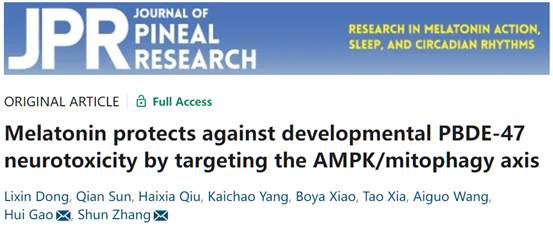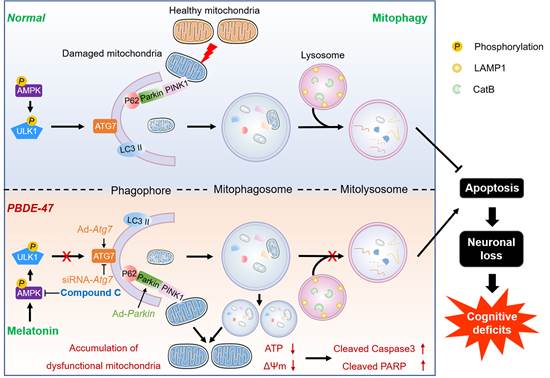Professor ZHANG Shun 's team from School of Public Health, Tongji Medical College, Huazhong University of Science and Technology published a research paper entitled " Melatonin against developmental PBDE-47 neurotoxicity by targeting the AMPK / mitophagy axis " on April 27,2023 in the Journal of Pineal Research, a high-level journal in the fields of endocrinology and metabolism, neuroscience and physiology. The new mechanism of developmental neurotoxicity caused by environmental persistent organic pollutant 2,2 ', 4,4 ' -tetrabromodiphenyl ether (PBDE-47) by inducing mitophagy damage was revealed. It was reported for the first time that melatonin can regulate mitophagy through AMP-activated protein kinase (AMPK) / UNC-51-like kinase 1 (ULK1) signaling pathway, thereby alleviating the neurotoxicity of PBDE-47.

The neurotoxicity of 2,2',4,4'-tetrabromodiphenyl ether (PBDE-47) is closely linked to mitochondrial abnormalities while mitophagy is vital for mitochondrial homeostasis. However, whether PBDE-47 disrupts mitophagy contributing to impaired neurodevelopment remain elusive. Here, this study showed that neonatal PBDE-47 exposure caused learning and memory deficits in adult rats, accompanied with striatal mitochondrial abnormalities, neuronal apoptosis and the resultant neuronal loss. Mechanistically, PBDE-47 suppressed PINK1/Parkin-mediated mitophagy induction and degradation, inducing mitophagosome accumulation and mitochondrial dysfunction in vivo and in vitro. Additionally, stimulation of mitophagy by adenovirus-mediated Parkin or Autophagy-related protein 7 (Atg7) overexpression aggravated PBDE-47-induced mitophagosome accumulation, mitochondrial dysfunction, neuronal apoptosis and death. Conversely, suppression of mitophagy by the siRNA knockdown of Atg7 rescued PBDE-47-induced detrimental consequences. Importantly, melatonin, a hormone secreted rhythmically by the pineal, improved PBDE-47-caused neurotoxicity via preventing neuronal apoptosis and loss by restoring mitophagic activity and mitochondrial function. These neuroprotective effects of melatonin depended on activation of the AMP-activated protein kinase (AMPK)/Unc-51-like kinase 1 (ULK1) signaling. Collectively, these data indicate that PBDE-47 impairs mitophagy to perturb mitochondrial homeostasis, thus triggering apoptosis, leading to neuronal loss and consequent neurobehavioral deficits. Manipulation of the AMPK-mitophagy axis via melatonin could be a novel therapeutic strategy against developmental PBDE-47 neurotoxicity.

The School of Public Health, Tongji Medical College, Huazhong University of Science and Technology is the first unit to complete this research paper. DONG Lixin, a 2017 doctoral student, SUN Qian, a 2022 doctoral student, and QIU Haixia, a 2020 master 's student, are the co-first authors of the paper. Professor ZHANG Shun of the School of Public Health and Dr. GAO Hui of the Affiliated Tongji Hospital are the co-authors of the paper. The research work was supported by the National Natural Science Foundation of China, Tongji Hospital Excellent Youth Science Foundation and China Postdoctoral Science Foundation.
Paper link:https://doi.org/10.1111/jpi.12871
